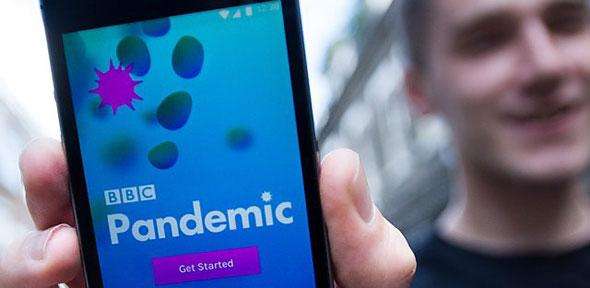App-based citizen science experiment could help researchers predict future pandemics

A new app gives UK residents the chance to get involved in an ambitious, ground-breaking science experiment that could save lives.
The most likely and immediate threat to our species is a global pandemic of highly infectious flu. Such a pandemic could be so serious that it currently tops the UK Government's Risk Register.
Scientists from the University of Cambridge and London School of Hygiene and Tropical Medicine are attempting to collect a gold standard data set that can be used to predict how the next pandemic flu would spread through this country - and what can be done to stop it. They need your help.
UK residents can take part in the BBC Pandemic experiment simply by downloading the Pandemic app onto your smartphone via App Store or Google Play from today.
The app and results will be featured in a documentary on BBC Four in 2018, to be presented by Dr Hannah Fry and Dr Javid Abdelmoneim.
Data gathered via the app could be key in preparing for the next pandemic outbreak. In order to better understand how an infectious disease like flu can spread, researchers need data about how we travel and interact.
Two experiments will be conducted through the app: the National Outbreak, which is open to anyone in the UK from 27th September 2017; and the Haslemere Outbreak, a closed local study that is only open to people in the town of Haslemere, Surrey, and runs for 72 hours starting on Thursday 19th October 2017.
In the National Outbreak, the app will track your approximate movement at regular intervals over a 24 hour period – all data will be anonymised, so the app will not know exactly where or who you are. The app will also ask some questions about your journeys and the people you spent time with during those 24 hours.
All data collected will be grouped to ensure anonymity, and a research team from the University of Cambridge and the London School of Hygiene and Tropical Medicine will use it to predict how a flu pandemic might spread across the country – and determine what can be done to stop it.
Professor Julia Gog, who specialises in the mathematics of infectious diseases, and her colleagues from Cambridge's Department of Applied Mathematics and Theoretical Physics have helped design the experiment and will be processing the data, running statistical analyses, and building and running the pandemic models.
"This will give us a chance to explore a range of different scenarios," said Professor Gog. "This could the best data set we've ever had on the movement of people in the UK, and could help support future research projects to control infectious diseases – for a researchers like us, this is incredibly exciting."
There are flu outbreaks every year but in the last 100 years, there have been four pandemics of a particularly deadly flu, including the Spanish Influenza outbreak which hit in 1918, killing up to 100 million people worldwide. Nearly a century later, a catastrophic flu pandemic still tops the UK Government's Risk Register of threats to this country. Key to the Government's response plan are mathematical models which simulate how a highly contagious disease may spread. These models help to decide how best to direct NHS resources, like vaccines and protective clothing. But the models are only as good as the data that goes into them.
The more people of all ages that take part in BBC Pandemic, the better that data will be.
By identifying the human networks and behaviours that spread a deadly flu, the app will help to make these models more accurate and, in turn, help to stem the next pandemic.














